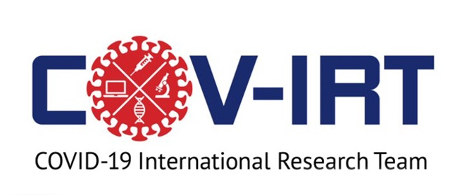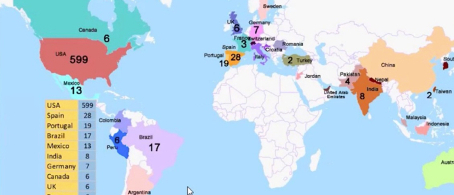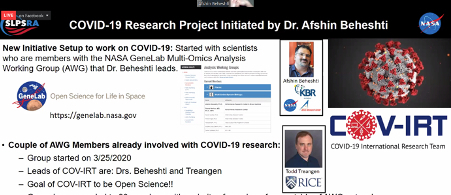On Friday, April 17, 2020, COV-IRT (COVID-19 International Research Team), co-lead by Dr. Afshin Beheshti from NASA Ames Research Center and Dr. Todd Treangen from Rice University, held its first virtual symposium kicking off the Consortium COVID-19 Project: Rapid Therapeutic Design from multi-omics analysis to testing in in vivo models. In a matter of a few days, over 1000 people registered for the symposium. Approximately 1450 people participated on the Rice University-hosted Zoom meeting throughout the day, with over 650 people at one time and there were over 3100 views on Facebook live for this virtual event – with attendees spanning from 18 countries and nearly 100 institutions.
The Consortium COVID-19 project was initiated by scientists who are members of the NASA GeneLab Multi-Omics Analysis Working Group (AWG) led by Dr. Afshin Beheshti from NASA Ames Research Center. Starting with a few of the AWG members that were already involved with COVID-19 research, COV-IRT quickly formed on March 25 and now has grown to 90 members, bringing together multi-disciplinary researchers willing to analyze multi-omics data from COVID-19 patients, build and develop therapeutics/vaccines, and test newly developed COVID-19 therapies as an open science collaborative group. The active COV-IRT members from NASA Ames Research Center include: Afshin Beheshti (SCR), Sylvain Costes (SCR), Sigrid Reinsch (SCR), Vanesa Gomez Gonzalez (TI), Craig Everroad (SSX), Paula Maza Marquez (SSX), Jared Broddrick (SSX), Mike Lee (SSX), Sharon Grim (SSX), Catherine (Cassie) Conley (SSX), and Amanda Saravia-Butler (SCR). This team is just one of the groups joining forces with the COVID-19 High Performance Computing Consortium to bring together Federal government, industry, and academic leaders to support COVID-19 research.
The overall goal of the Consortium COVID-19 Project: Rapid Therapeutic Design from Multi-omics Analysis to testing in in vivo models, is to enroll COVID-19 patients in a research study where the data collected will help the team apply their expertise in designing drug targets and developing tests in in vivo models for to study COVID-19. Ultimately, this study will help to categorize COVID-19 patients by different clinical symptoms and test results, leading to better allocation of healthcare resources and advanced monitoring in determining potentially severe COVID-19 patients before those cases require intensive care.
The group is projecting to finish their first analysis and publication in a short time frame of up to four weeks. They anticipate many more publications to come in the weeks to follow. Already, there is a better understanding of the virus. With each new member of this team, another piece of the puzzle is brought to the table, and with every novel finding, it is a step forward to help the scientists understand COVID-19.
For more information on the COV-IRT Team’s research approach, please click here.
For the most up to date information on COV-IRT’s work please see the COV-IRT Twitter and Facebook.



























